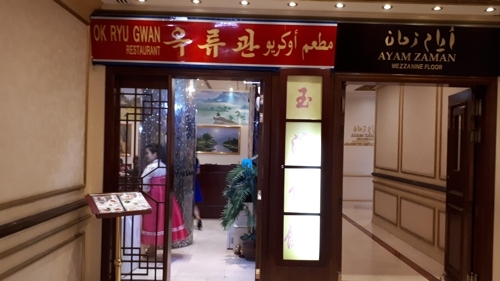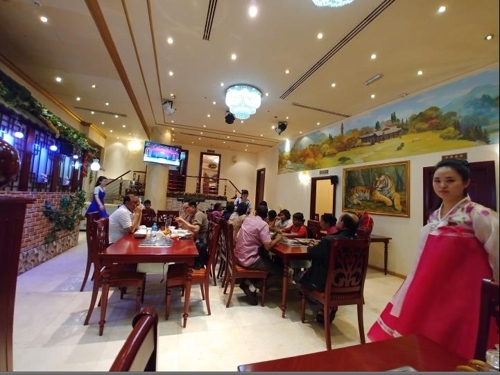A North Korean restaurant specializing in "Pyongyang naengmyeon" bustles with South Koreans even at late lunchtime, with most of them ordering the dish that originated in the North's capital.
"The taste of our naengmyeon is different from that at other restaurants as we use buckwheat, the raw material for naengmyeon, directly brought from Pyongyang," bragged a North Korean waitress at Okryugwan, located on the first floor of Ascot Hotel in Dubai.
Pyongyang naengmyeon is a bowl of cold noodles and one of the North's signature dishes.
The dish is gaining explosive popularity among South Koreans since it was served at an inter-Korean summit dinner late last month. In preparing for his historic talks with North Korean leader Kim Jong-un, South Korean President Moon Jae-in proposed the cold noodles from Pyongyang's famous Okryugwan Restaurant as a dish for the summit dinner, and the North accepted.
 |
(Yonhap) |
"Isn't (Pyongyang naengmyeon) the hot best-seller? I've really wanted to taste Okryugwan's Pyongyang naengmyeon, which is not available in South Korea, even though I don't like naengmyeon," said a South Korean employee, just identified by his family name Kim.
The Okryugwan Dubai has been thronged by South Koreans as of late although it is located far from South Korean residential areas.
The North Korean flag flutters on the outer wall of the hotel, giving an uncanny impression to South Koreans.
At present, there is one Okryugwan in Dubai and two in Abu Dhabi in the United Arab Emirates, which has diplomatic relations with the reclusive North.
Last October, the Middle East nation decided to not issue visas for North Korean workers anymore in compliance with U.N. sanctions on the North's missiles and nuclear weapons.
It also remains uncertain whether the UAE government will renew visas for existing North Korean workers and licenses for North Korean business sites.
Dubai Okryugwan is well-known among South Koreans residing in the UAE but has been avoided due to tense inter-Korean relations brought on by the North's incessant missile and nuclear provocations in recent years.
Until last year, the South Korean consulate in Dubai occasionally called for South Korean residents and tourists to refrain from visiting the restaurant. They also avoided the restaurant in fear of unexpected troubles.
But the tacit "off-limits" were naturally lifted as the thawing mood between the two Koreas reached its peak when the countries' leaders met at the truce village of Panmunjom in the Demilitarized Zone, bisecting the Korean Peninsula, on April 27.
 |
(Yonhap) |
"Many (South Koreans) come (to the restaurant) of late," the waitress, only identified by her surname Lee, said while beaming.
Asked whether she saw the scenes of the inter-Korean summit, the waitress said she watched them live at her residence.
"The most touching moment was when North Korean first lady Ri Sol-ju and South Korean first lady Kim Jung-sook embraced each other," she said.
"They looked like a mom and a daughter. I'd like to see North and South Korea get along well like them."
Lee, who looks to be in her early 20s, said North Korean employees at the restaurant return home after working for three to five years and take a vacation to Pyongyang once a year.
The way the North Korean employees refer to the South Korean president has also changed.
In the past, they called the South Korean leader "that president" but now respectfully call him "Mr. President Moon Jae-in."
"I felt like I was being watched at the restaurant in the past, but now that has suddenly changed to a place where I want to bring my family members," a South Korean guest said. The restaurant, which has some 15 employees, serves a 200-gram bowl of naengmyeon for 60 dirham ($16.33), as well as Heineken beer and Pyongyang soju, a distilled Korean liquor. (Yonhap)









